Subscribe by Email
-
Recent Posts
Category Archives: Movies
The Dog Stars and Movie Briefs
This week I’ve been reading a nonfiction book about the doomed Donner Party — you know, the group of emigrants lead by George Donner and James Reed who set out from Missouri for California in covered wagons in 1846. It’s by the same author — Daniel James Brown — who wrote “The Boys in the Boat” and I’m enjoying it quite a lot. I’ll report back more once I get through its snows of the Sierra Nevadas and it comes to an end.
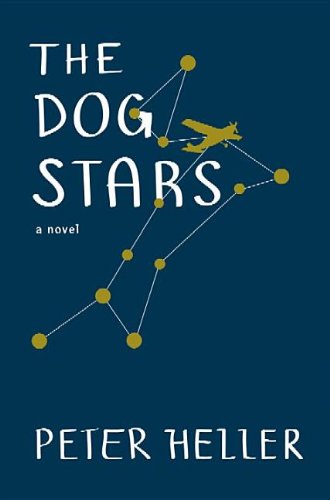
Meanwhile I finished listening to the audiobook of Peter Heller’s 2012 novel “The Dog Stars.” Of course it’s another apocalyptic novel — where is my mind this year — ready for end of the world?! Like Emily St. John Mandel’s novel “Station Eleven,” “The Dog Stars” is set quite a few years after a flu or virus has wiped out most of humanity. It’s two primary characters are a fortyish pilot and fisherman named Hig and an older, gun nut named Bangley who have settled at a country airstrip in Colorado, trying to fend off occasional attacks from violent survivors. Their families didn’t survive the pandemic, but Hig still relies on his very dear dog companion Jasper, a Blue Healer mix.
A lot of the time, Hig spends flying an old Cessna around, monitoring the area for intruders and visiting a hamlet of sick families a distance away who have the tainted blood. Then one day, he hears a distant response on his plane’s intercom and realizes good things might still be out there. He leaves their place behind, and sets out to investigate. What happens and whether he will return kept me glued to the audio all week while raking leaves, doing chores, and walking my dog.
I liked the characters of Hig and Bangley — a crotchety, but winning combo. And Jasper of course. Hig’s love for his dog in the story earned major points with me, being a dog lover. I was also impressed by the author’s vivid descriptions of life under such dire conditions. His writing was at times poetic and touching. Though I wasn’t sure about parts of a romance in the book, it seemed a bit goofy or just perhaps out of place, but I was willing to let it ride.
To compare, “The Dog Stars” is perhaps a tad scarier and more survival focused perhaps than “Station Eleven,” but not as scary or as dark as Cormac McCarthy’s “The Road.” The novel is a bit hopeful, which is nice when you’re facing extinction. I liked “Station Eleven” best, but also enjoyed “The Dog Stars” as it’s both suspenseful and well written. It has heart. Actor Mark Deakins read the novel for the audio, and is quite excellent.
As for brief impressions of three fall movies I’ve seen:
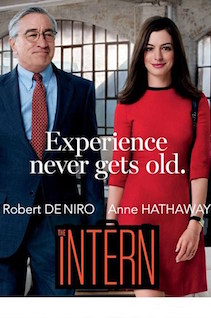
“The Intern” — I had to suspend my disbelief in a couple places in this Nancy Meyers’ movie, but I still ended up enjoying it. I credit actors Robert De Niro and Anne Hathaway for their performances and the cool shots of New York. I also had low expectations going in and so was pleasantly surprised it exceeded that. I found it a nice feel-good story but not over-the-top saccharine.
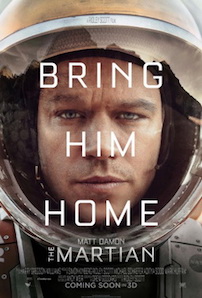
“The Martian” — Oh yeah I had been looking forward to Matt Damon as Mark Watney, and I was definitely entertained by this 3-D action space film adapted from Andy Weir’s bestselling book. I liked it but I guess I liked the book a tad better. The film had some great imagery, but for whatever reason it did not stay with me for long like substantial films usually do.

“Steve Jobs” — Whoa, does this film have a lot of dialogue in it or what. It’s filled to the brink, courtesy of Aaron Sorkin, and slightly reminiscent of “The West Wing.” It’s innovative and cuts to some of Steve Jobs’s inner character. I liked it but it also wore me out in parts — with the around and around cerebral dialogue. But Michael Fassbender seemed amazing as Jobs, and Kate Winslet and Seth Rogen were quite excellent too.
That’s it for now. How about you — have you read “The Dog Stars” or seen any of these movies, and if so, what did you think? Continue reading
Posted in Books, Movies
26 Comments
Watchman and Mockingbird
Yes, Harper Lee’s “Go Set a Watchman” is out Tuesday and the Twitter-sphere is awash with the news that Atticus Finch is now a racist who once attended a Klan meeting etc. When I read Michiko Kakutani’s New York Times review of it on Friday I just about fell out of my chair. I couldn’t believe it. I about gagged. Obviously I wasn’t expecting Atticus to be turned into a racist and Jem to be dead in the new book. I’m not sure what I expected but surely it wasn’t a complete reversal of things in “To Kill a Mockingbird.”
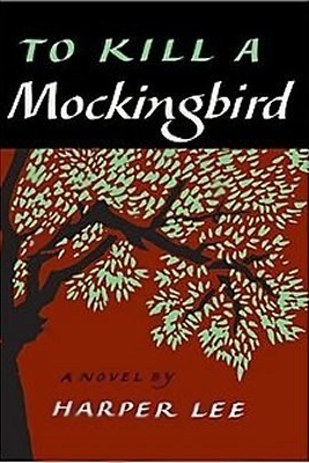
Just last week I reread “To Kill a Mockingbird” to get myself ready for the new book. I revisited Jem, Scout, Dill, Atticus, Calpurnia, Boo Radley, and the small town of Maycomb, Alabama in the 1930s, and I thought the novel held up from when I read it in school. Scout as the six-year-old narrator is funny but sincere. She’s a tomboy who butts heads with authority and gets into fights at school with name-callers. I identified with her when I was younger. So many did. Atticus, too, was someone you looked up to. He stood for equal rights, justice and being a devoted father. He was a lawyer, defending Tom Robinson, a black man falsely accused of rape against a white woman. It wasn’t an easy time; the story is set in the Deep South during the Depression and times of racial inequality.
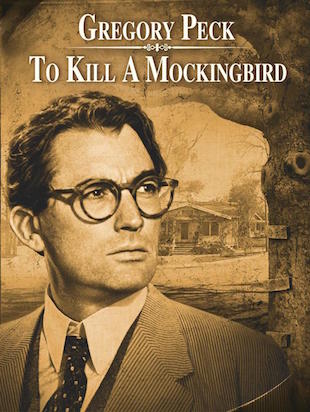
As soon as I finished the book, I rewatched the 1962 film of it, with Gregory Peck as Atticus. I had to see if everything was the same. The film condenses the book but maintains the essentials and keeps the ending. But while the novel deals more with the daily life and adventures of Scout and Jem in Maycomb, the film focuses more on Atticus and Tom Robinson’s trial. I mean if you had Gregory Peck for the role, wouldn’t you? Gregory Peck is Atticus, or was to me. The kid actors are wonderful too; I still laugh at Dill. The characters in the book are so relatable, and who hasn’t come upon a Boo Radley house or person? The story long ago had sunk into the American psyche, and I made myself familiar upon this second reading with even its smallest details.
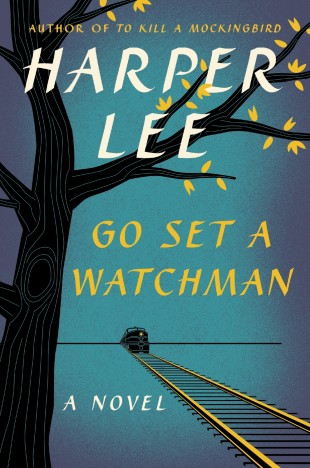
And now — somehow — I need to wrap my head around everything surrounding Lee’s “Go Set a Watchman.” I’ve calmed down a bit since my initial reaction a few days ago. I must say since I just read “Mockingbird” and have good feelings from that, I feel less inclined to read “Watchman” right away. If Atticus is a racist and the story is a bit of a mess (from what I hear of the second half), do I really want to go down that path immediately?
I’m aware that apparently “Watchman” was a prototype or an early draft of “To Kill a Mockingbird,” though “Watchman” picks up the characters’ lives 20 years later. It’s hard to even reconcile how this early draft morphed into the eventual classic “To Kill a Mockingbird,” which indicted racism and became associated with the civil rights movement.
For now I’ll look at these novels as two separate creations of Lee’s. It seems she explored ways in which she sought to write her narrative — first, as an adult in New York coming home to a segregated South — and second as a child who hadn’t left her hometown yet. I sort of see the two Atticuses as separate people in the two books, and not one and the same person. (Maybe that’s just my way to deal with how opposite Atticus is in “Watchman” from “Mockingbird” — a transformation that obviously is bizarre and bewildering to so many.) If Lee’s goal was to write about the racial injustices she grew up with, the narratives in the “Watchman” and “Mockingbird” are definitely two different ways of doing it.
I still plan to read “Go Set a Watchman” but maybe not while “To Kill a Mockingbird” is so fresh in my mind. I’m curious about Lee’s theme of the alienation of a daughter returning home — as apparently, the main conflict in “Watchman” is Scout’s struggle in coming to terms with a father who is not who she believed he was. This could be an interesting theme — or then maybe not — if it fails to compel or is not done well.
Though many believe “Watchman” will forever change how we read or view “To Kill a Mockingbird” and Harper Lee, I still value the 1960 version for what it is on the page and the story it portrays.
What about you — what do you think about the two books and will you be reading “Go Set a Watchman”?
Posted in Books, Movies
19 Comments
Tiny Little Thing and Suite Francaise

Happy 4th of July weekend to all those in the U.S. I hope you enjoyed some fireworks and barbecues. We had a nice Canada Day here on July 1, hiking in the mountains, see photo at left. On Sunday, we plan to go for a bike ride and then watch the U.S. women’s soccer team hopefully win the World Cup against defending champs, Japan. Go team!
Meanwhile this week, I did some “beach” reading, though I live no where near the ocean. I wanted to lighten things up with a good summer read, so I snapped up an e-copy of Beatriz Williams’s latest novel “Tiny Little Thing” from the publisher via NetGalley.
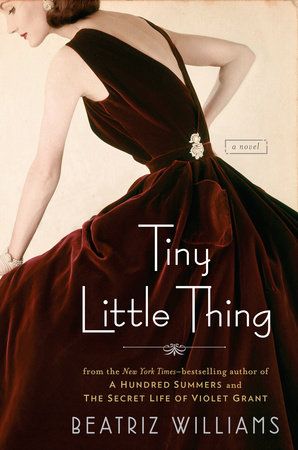
This is the first book I’ve read by this author, and though it was fine, I wasn’t overly taken with it. Maybe I had heard so much about this author and how her novel “A Hundred Summers” is a favorite beach read of so many people that I was expecting beach magic. Or alas, maybe this genre of fiction isn’t exactly my cup of tea? Would you call it commercial historical fiction or historical romantic fiction or something else? Whichever, I have a feeling that Williams’ fans, despite any of my misgivings — I am likely in the minority here — will like this novel just as well.
Set in the 1960s, “Tiny Little Thing” is about a woman (Christina “Tiny” Schuyler) who thinks she’s doing the right thing by marrying Frank Hardcastle, a man from a wealthy Cape Cod family who’s apparently destined for political greatness. He’s running for Congress and Tiny is the perfect “trophy” wife. They make an attractive power couple and have a promising future.
But as the campaign gets underway, various occurrences lead Tiny to doubt her life’s direction and the relationship with her husband. Her volatile sister arrives for a visit, as well as her husband’s cousin, Caspian, who became close to Tiny two years before. Tiny’s also being blackmailed by somebody who has incriminating photos of her. It appears everyone has a secret of some sort which plays out toward the end.
The characters felt a bit dopey to me in this “Mad Men”-era tale, but after awhile enough was happening to keep me going. I typically like political novels, and this one had a Kennedy-esque feel of a privileged wealthy family gone wrong. “Tiny Little Thing” was all right as a beach read — I liked how Tiny questions her identity of always having to be the good girl and doing what’s right because of her family’s expectations — but I felt the story seemed sort of contrived at times with not a great deal of depth.
I didn’t realize it’s one of three novels by Beatriz Williams about the Schuyler sisters — the first being “The Secret Life of Violet Grant” about Vivian Schuyler, then there’s “Tiny Little Thing” about older sister Tiny, and in November the last one will be about sister Pepper Schuyler called “Along the Infinite Sea.” I probably just need to go back sometime and read Williams’s bestseller “A Hundred Summers,” which everyone seems to talk about.
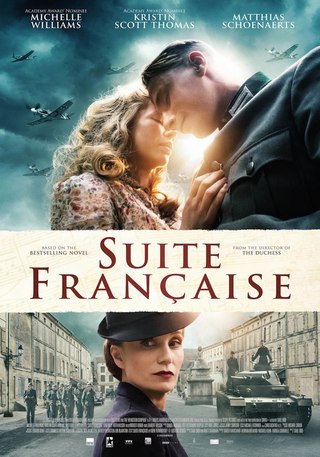
Meanwhile our small artsy theater in town is playing the film “Suite Francaise,” which we enjoyed seeing last night. Do you remember the novel of it by Irène Némirovsky, which was published in France in 2004 and became an international bestseller? It’s incredible that the story was written during the Occupation of France in 1940 and ’41 and was only read and published by the author’s daughter some fifty or sixty years later. Nemirovsky tragically died at Auschwitz in 1942, but her writing carried on and made quite a mark.
In the film, American actress Michelle Williams plays Lucile Angellier, a French villager who’s husband has gone off to fight in the war. Lucile lives with her well-off mother-in-law (played by Kristin Scott Thomas) who’s a landlord of several properties. As Germany takes over, they are billeted with a German soldier who shows them kindness. Over time, Lucile and the soldier start to fall for one another, but harsh wartime events intercede.
It reminded me a little of the recent novel “All the Light We Cannot See,” since it involves a young French villager and a German soldier, but “Suite Francaise” takes place earlier in the Occupation and is more involved in ways. You get an idea of how villagers snitched on one another, stole, and did what was necessary to stay alive under the scary circumstances. It’s a pretty powerful movie with a bit of action that’ll put you on edge. I didn’t realize this important book had been made into a movie, but I’m glad it did. It broadens my horizons once again on WWII events and made me feel the humanness of people even under war.
What about you, have you seen or read “Suite Francaise” and what did you think? Or what did you think of “Tiny Little Thing” or other Beatriz Williams’s novels? Continue reading
Posted in Books, Movies
20 Comments
Woman in Gold
We’re off to participate in the Golden Triangle bike ride this Canadian long weekend and will be unplugged from gadgets. I’ll be bringing a paperback copy of Lily King’s 2014 novel “Euphoria” with me to finish. So I plan to review that next week.
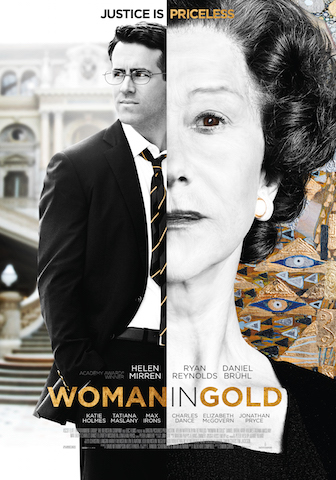
Meanwhile the hub and I finally saw the Helen Mirren, Ryan Reynolds movie “Woman in Gold” last night, which came out in April, and we both really enjoyed it. It’s much better than all the previews made it seem, or the reviews for that matter. I was surprised that the Rotten Tomatoes’ summary called it a “disappointingly dull treatment of a fascinating true story.”
I didn’t find the movie dull in the least, and was utterly absorbed by Maria Altmann’s real life story. Most know by now, that the “Woman in Gold” is about an elderly Jewish woman living in Los Angeles who embarks in 2004, along with her inexperienced young lawyer, on a battle to reclaim her family’s paintings seized by the Nazis during WWII. Among the paintings was Gustav Klimt’s famous portrait of Adele Bloch-Bauer I, who was Maria’s aunt and lived with her family while Maria was growing up in Austria.

Helen Mirren, who plays Maria, is once again terrific in her role as is Ryan Reynolds as her nerdy lawyer, Randol Schoenberg. Both give dynamic performances in their quest of court cases to get the paintings back. Though what really makes the movie come to life are its frequent flashbacks to Maria’s younger years with her aunt and family in Austria and what happens to them when Nazi Germany takes over the country in 1938. There’s chilling and heartbreaking scenes that make the latter story of the paintings reclamation all the more significant.
It’s truly a remarkable story about remembrance and justice for Holocaust victims and one that continues to play out for other Jewish refugees and heirs who are reclaiming possessions and art works from the war. Just today the New York Times reported a Matisse painting was returned to a descendant of Paul Rosenberg’s, a leading art dealer of the times whose collection was looted by the Nazis. See the story here.
For more on Nazi Germany’s plundering of Europe’s great art works during WWII, I would also like to see the 2006 documentary “The Rape of Europa,” which was adapted from the prize-winning 1994 book by Lynn H. Nicholas, and I’ve read is good. I have seen George Clooney’s 2014 movie “The Monuments Men” and unfortunately that movie didn’t seem half as good to me as “Woman in Gold.”
What about you — have you seen the “Woman in Gold,” or any films on that similar topic? And if so, what did you think? Continue reading
Posted in Movies
16 Comments
Spring Days

Leaves and buds are just opening here, and it’s been a productive couple of weeks of home and yard projects. I’m excited that I might be able to do my spring planting earlier this year as the weather is being fairly cooperative. I almost forgot how nice spring can feel. We plan to take a long bike ride in the backcountry on Sunday.

The town here is all abuzz about the NHL hockey playoffs since our team can clinch a first-round series win tonight at home, if only they would. I’m hoping it doesn’t prove elusive. In terms of playoff hockey, it’s been a long dry spell here and the dream of another round is within reach. And from what I’ve learned: never underestimate hockey in a northern country.

Meanwhile this week I want to congratulate author Anthony Doerr for winning the 2015 Pulitzer Prize for Fiction for his World War II novel “All the Light We Cannot See.” My Dad gave me this book for Christmas, and I’m excited to dive into it this spring. It’s waiting for me on the shelf, and I’ve heard from others how good it is. Set in occupied France, it interweaves the story of a blind 14-year-old French girl and a young German soldier whose lives cross paths toward the end of the book. I hear it’s terrific. Have you read it?

Also congratulations to Siri Hustvedt who just won the 2014 Los Angeles Times Book Prize for Fiction for her novel “The Blazing World.” According to the publisher, it tells the story of an enigmatic artist who, after years of having her work ignored, ignites an explosive scandal in New York’s art world when she recruits three young men to present her creations as their own. Yet when the shows succeed and she steps forward, one of the men betrays her and they get involved in a deadly game. I remember Barbara over at the blog wellwell touting this novel, and I’m sure it’s great as years ago I recall being pretty blown away by Hustvedt’s 2003 novel “What I Loved.” Her latest one seems to be brimming full of ideas, and Booklist calls it a “wrenching novel of creativity, identity, and longing.” Count me in for it.
In other book news, I came across a few cool articles this week that I thought I’d pass along. The first one in The Washington Post titled “I read books by only minority authors for a year. It showed me just how white our reading world is” by Sunili Govinnage definitely caught my eye. It makes a lot of strong points about the importance of reading diversity, and it seems like a great idea to take a year and read such a book list. I expect I’d explore novels in a number of countries and learn a lot. It seems a worthy, interesting goal.
The next article, “Owning a bookstore means you always get to tell people what to read,” is another good one by Ann Patchett, which was in The Washington Post. It extols the many joys of recommending books to people. I’m sure that’s why so many people like blogging about books. And many of today’s bloggers, like me, also worked in bookstores or the publishing industry along the way. Many still get a kick from pushing good reads.
The last article, “Romanticizing the Reader” by Diane Ackerman in the New York Times is a neat one about how “readers and writers provide a kind of outside family for one another” and that she sees the “reader as a collaborator” who “leaves individual imprints on a book they have read.” Just as a reader might romanticize an author so too does an author romanticize a reader. There’s “something inevitable and touchingly human about it,” she says. If you have time, you might want to check these articles out.
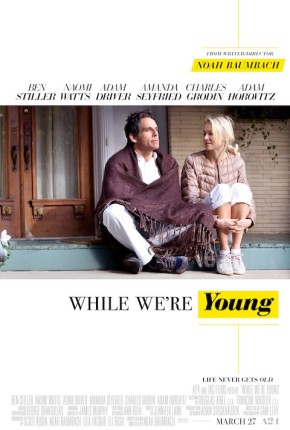
Meanwhile, the Noah Baumbach indie movie “While We’re Young” just made it to our neck of the woods and we saw it Friday night. It’s quite an enjoyable comedy about a mid-forties New York married couple — played by Ben Stiller and Naomi Watts — whose staid lives change when they start hanging out with a young hip couple they meet — played by Adam Driver and Amanda Seyfried. Oh the film is funny, but it also touches on some truths about parenthood, friendship, ambition and aging that its viewers likely have had. It speaks to middle-agers mostly, but can be enjoyed by a variety perhaps. It reminded me a bit of an old Woody Allen New York comedy about married couples, and I liked it more than I thought I would.
It’s definitely my favorite Noah Baumbach movie so far … if you’ve seen “Frances Ha” (2012), “Greenberg” (2010), “Margot at the Wedding” (2007) or “The Squid and the Whale” (2005). They’re all sort of quirky, but in those earlier ones the protagonists are usually sort of grumpy and not very likable. “While We’re Young” is more accessible and the main characters are more sympathetic. It’s both funny and interesting and includes a great cast. Kudos to Ben Stiller for his best role in years? Something tells me I should go back and rent “The Secret Life of Walter Mitty” — just to see his facial expressions.
What about you — have you read any of these books or seen any of these movies — and if so, what did you think? Continue reading
Posted in Books, Movies
14 Comments
Oscar Night

I was just reading in the newspaper about how no one really cares about watching the Academy Awards anymore and that the winners are all so predictable and the nominee choices are sexist and without diversity. Has the Oscars grown old, stale, and out of touch with society? Perhaps so. I’m not exactly sure why I still watch the entire drawn-out broadcast each year, but I guess I still enjoy the hubbub over the year’s best films and discussing films of interesting substance. And though the Best Picture nominees this year might be filled with predominantly white, male protagonists, the films offer quite an array of subject matter. Similar to a good book, I like how the best films can transport one to a place or situation that is not our own and draw us into remarkable stories. The list below is of the nominated films I’ve seen over the past months in the order of when I saw them.

“Begin Again” I loved this little movie about a singer-songwriter in New York who collaborates on an album with a disgraced music executive. It’s by same writer and director as the movie “Once,” whose story also captured the magic of music. Mark Ruffalo and Keira Knightley shine in “Begin Again,” and I can’t believe Knightley actually sings the songs for the movie. That takes guts. The film is nominated for Best Original Song for its tune “Lost Stars” and I’m hoping it will win.
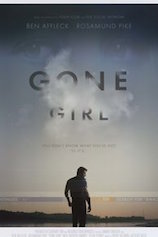
“Gone Girl” This film adaptation did a great job replicating the suspense and creepiness of the popular suspense novel by Gillian Flynn. Kudos to the filmmakers and to Ben Afflect and Rosamund Pike for getting the flawed Nick and Amy so right. Pike is nominated for Best Actress, deservedly so. I’m just a bit worried she’ll be forever typecast in my mind as the diabolical Amy no matter what roles she takes on next. “Gone Girl” received 1 nomination for Best Actress.
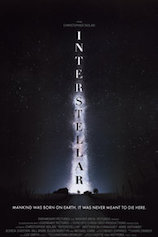
“Interstellar” Funny, I didn’t like director Christopher Nolan’s other film “Inception,” but I thoroughly enjoyed this time puzzle story about a group of astronauts who travel through a wormhole in outer space. The film is thought-provoking and elegantly shot with some cool special effects too. My husband and I thought it much better than the prior Oscar space flick “Gravity.” “Interstellar” is up for 5 Oscars: Original Score, Production Design, Sound Editing, Sound Mixing, and Visual Effects, and I’m hoping it’s going to win a couple.

“Birdman” I loved this clever black-comedy film about a washed up actor who tries to revive his career by staging a Broadway play. There’s a lot of cool actors and performances in this. And along with “The Imitation Game,” “Birdman” was my favorite film of the year. It’s up for 9 nominations: Best Actor, Best Supporting Actor, Best Supporting Actress, Best Picture, Best Cinematography, Best Director, Sound Editing, Sound Mixing, and Best Original Screenplay. I particularly want it to win for Screenplay, if not also for Best Picture.

“The Imitation Game” Another favorite film of the year for me. What an amazing story! About a team of mathematicians, including Alan Turing, that break the Nazis’ Enigma Code during WWII. Benedict Cumberbatch is terrific as Turing and any other year would likely win Best Actor. But I’m a bit afraid that he and the film will be snubbed out of many awards because much of the attention seems elsewhere. “The Imitation Game” is nominated for 8 Oscars: Best Actor, Best Supporting Actress, Best Picture, Best Director, Film Editing, Original Score, Production Design, and Adapted Screenplay.

“Unbroken” This film based on Laura Hillenbrand’s bestselling book about Louis Zamperini’s life, primarily in a Japanese prisoner of war camp during WWII, wasn’t nearly as good as the book but did have compelling parts to it. I’m a bit surprised it was snubbed in nominations, receiving only three: Cinematography, Sounds Editing and Sound Mixing. It wasn’t even nominated for Best Adapted Screenplay which was done by the Coen brothers. But perhaps it’ll win for Cinematography.

“Boyhood” I saw this nearly three hour film on pay-per-view TV. Much has been talked about how it was filmed over 12 years. It’s pretty down to earth but it surprisingly engaged me even though it’s simply a look into the life of a family and particularly of a boy’s growing up. The family doesn’t have a lot of money and struggles through the mom’s relationships and divorces; it ends once the boy gets to college. “Boyhood” comes off feeling quite real, which interested me. I didn’t find it my favorite but I know many others think it should win Best Picture. Patricia Arquette is expected to win for her role as the mother. It’s up for 6 nominations: Best Supporting Actor, Best Supporting Actress, Best Picture, Best Director, Film Editing and Original Screenplay.
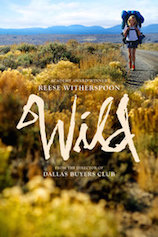
“Wild” Based on the bestselling book by Cheryl Strayed, this film, about a woman trying to overcome her grief over the death of her mother and the end of her marriage by walking the Pacific Coast trail, seemed to live up to the book. It has some solid performances along with a scenery that’s tough to beat. It’s up for 2 nominations: Best Actress and Best Supporting Actress. Hooray for the return of Laura Dern.

“The Judge” I saw this film recently on pay-per-view TV. It’s about a son who returns to his hometown to defend his father, a judge, against a murder charge. I like Robert Downey Jr. and Robert Duvall but this film has irksome characters that didn’t really resonate with me. Though there was a sad sense of a family’s missed opportunities which came through. It’s up for 1 nomination: Best Supporting Actor for Robert Duvall’s performance, who last won an Oscar for “Tender Mercies” in 1983.

“Selma” I was geared up to see this film about civil rights icon Martin Luther King’s campaign for equal voting rights in Alabama in 1965. It’s a moving, interesting account though I did find the actual footage of the march in Selma, which is included at the end, even more so and could’ve watched more of that. I was surprised that actor David Oyelowo who plays King didn’t receive a Best Actor nomination. The film did get 2 nominations: Best Picture and Original Song.
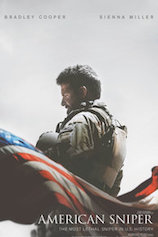
“American Sniper” I’ll be interested to see if this film receives any Oscars as there’s been considerable controversy swirling about it, as well as the ongoing murder trial of its protagonist. I recently reviewed the book and movie, see the post below. I’m not sure it will win any awards though it already won at the box office, becoming the top war movie of all time. It’s a stunning feat for sure. “American Sniper” is up for 6 nominations: Best Actor, Best Picture, Film Editing, Sound Editing, Sound Mixing, and Adapted Screenplay.

“Theory of Everything” This film, about the life and struggles of physicist Stephen Hawking and his wife, grew on me as it went along and I ended up liking it quite a lot. It had great performances by Felicity Jones and Eddie Redmayne and I’m glad I didn’t pass up seeing it, which I almost did. It’s perhaps the sleeper hit of the year and is up for 5 nominations: Best Actor, Best Actress, Best Picture, Original Score, and Adapted Screenplay.

“Still Alice” This film is based on Lisa Genova’s bestselling book, which I reviewed in January about a successful woman who is diagnosed with early-onset Alzheimer’s at age 50. It’s sad but also thought-provoking. Julianne Moore is considered a shoe-in for Best Actress. I found her performance quite good but perhaps no more extraordinary than others in her category. Though she gave the role a realness and dignity which I hope will succeed in bringing more attention to sufferers of Alzheimer’s. “Still Alice” is up for 1 nomination: Best Actress.
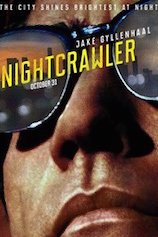
“Nightcrawler” I watched this crime thriller about a freaky L.A. crime-accident TV cameraman Friday on pay-per-view TV. Wow is this dark and creepy. Jake Gyllenhaal plays weirdo roles so well. I recall the other dark role he played in “Enemy” in which he portrays a professor and a look-alike man who he pursues. Strange. This film too is disturbing — but well worth a Friday night rental. Hooray, too, for the return of Rene Russo. “Nightcrawler” is up for 1 nomination: Original Screenplay.
So far these are the nominated films I’ve seen. 14 in all. I was going to see “Foxcatcher” starring Steve Carell, Chatum Tanning, and Mark Ruffalo but I never made it there. It looks like a good rental for later. Anyways, what were your favorite films or performances of the year? And do you think you’ll watch the Academy Awards? Continue reading
Posted in Movies
10 Comments
American Sniper
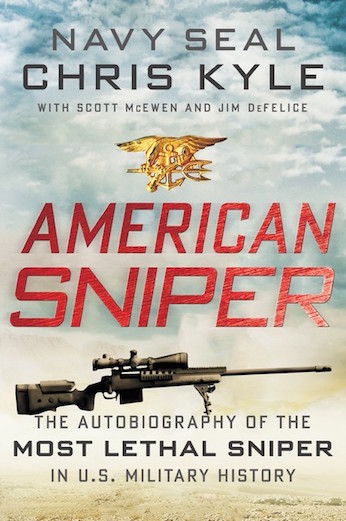
A couple weeks ago before I heard about the hoopla surrounding what right-wing or left-wing people were saying about the movie “American Sniper,” I picked up and read Chris Kyle’s 2012 book of it because I was curious to get a glimpse of the war in Iraq from a Navy SEAL’s first-hand account. My brother had given the book to my husband for Christmas and it was lying around. I didn’t know much about it other than it seemed like a scary-ass war book from its title, the movie trailers, and the fact that Chris Kyle is credited with the most sniper kills in U.S. military history.
Indeed the book is scary and disturbing as war is. I’m sure no one can fully comprehend the reality or horrors of war who haven’t experienced it as our troops have. Chris Kyle’s account is quite blunt and candid. He tells of how he became a Navy SEAL and about his four tours in Iraq from 2003 to 2009. He takes readers along the way through the intense urban combat he experienced in the Iraqi cities of Fallujah, Ramadi, and Sadr City. Mostly Kyle was responsible for sniper overwatches, where he and his team set up in or on top of buildings, protecting Marines or Army troops on the ground by shooting anyone who posed them harm. He also did foot patrols with troops and went door-to-door, weeding out insurgents and weapons caches.
It’s heart-pounding warfare not for the squeamish. Kyle was shooting to kill each time and makes no bones about it in the book. He was doing his job, he says, before the enemy killed him or other troops. He was so good at being a sniper that the insurgents labeled him the “devil of Ramadi” and put a bounty on his head, while U.S troops referred to him as “the Legend.” He placed his priorities in God, country, and family in that order (despite his wife’s disagreement). And his moral clarity about protecting his Team by killing enemies never wavers in the book. He has no regrets about his service other than he couldn’t save more U.S. troops, or trade places with the three U.S. Navy SEALS who lost their lives during his time there.
I’m sure Kyle saved very many lives in the line of fire. He served four tours in Iraq in incredibly dangerous conditions, while at the same time missing out on his family when his kids were babies. I commend him and the troops for their service to the country and Allied mission. He says in the book he wasn’t doing it for the Iraqi people, who he doesn’t seem to put much faith in, but solely for the U.S. He doesn’t go into why we were in Iraq in the first place but simply went where elected officials declared war.
Kyle’s view is definitely a patriotic account but is it, as some say, propaganda? I think he lets readers decide what they will. Quite a few will find the book like I did disturbing in his love of war and killing — how he was concerned with the numbers and in getting the most kills, and how he refers at some points to the Iraqis as savages and details mowing down the “bad guys’” and delighting in their slaughter. It takes a toll just reading about it, much less doing it. Though I’m sure we need tough guys like Kyle to wage our dangerous battles and protect the country.
Apparently the latest edition of the book has been toned down a bit. Though candidly opinionated by Kyle, the book at this point has been vetted by the military, two co-authors, and lawyers alike. Such scenes as in the movie’s trailer that shows a mother and son moving toward the U.S. troops with an RKG grenade was redacted from the book says the movie’s screenwriter. Gone, too, is the subchapter apparently in which Kyle wrote about punching out Jesse Ventura, which Ventura said never happened and in which he won a $1.8 million defamation lawsuit against Kyle.
Despite that, Kyle’s account is informative in bringing insight into how the troops worked in Iraq, into weapons, rank, tactics, what the landscape and war was like, what factions they faced, what SEALS are like, and what they did. The book also highlights how hard deployments are on military families and returning veterans. It shows the war abroad as well as the war at home, where spouses often raise children on their own and vets can’t get the help they need. Kyle’s wife, Taya, writes passages throughout the book about what she’s experiencing and the relations between her and Kyle.
At one point, it seemed the stress of warfare would break their marriage apart, but the book relates how with great effort they held on. By the end, with his wife’s urging, Kyle leaves the war and eventually begins a security company (Craft Intl) and starts helping veterans return to civilian life. The war changed Kyle; it undoubtedly took a toll and affected him. He seems to grow from it by the book’s end. Tragically Chris Kyle was killed in 2013 while helping a vet at a Texas gun range. Now the murder trial of him is all over the news.
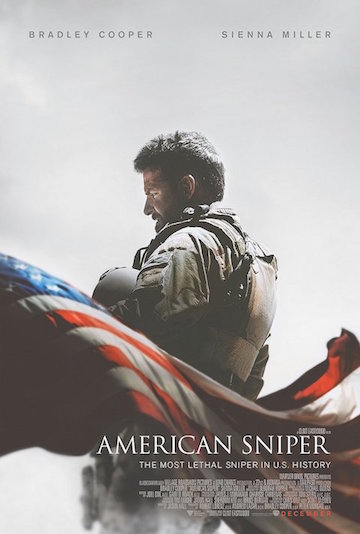
It’s prominent especially because the movie of “American Sniper” has been such an astounding blockbuster. I saw it on Sunday and would never have thought that it would become the top war movie of all time at the box office, nor the top movie of 2014, which it looks like it will be. The movie is effective and moving, rough to watch in parts, and in places powerful, but I wouldn’t pick it as the best war film ever.
It’s drawn controversy no doubt. Those on the right say it’s patriotic, heroic, and highlights the hardships of military families and vets, and also shows the toll the war took on Kyle. While some on the left see the movie as glorifying an unjust war, violence, and a gun culture run amok. Take your pick. I feel it’s more the former than the latter. It’s up for six Academy Awards. I’m still a bit puzzled by the huge success of it when other Iraq war films haven’t fared well.
The film differs from the book quite a bit, notably the movie has the U.S. troops trying to root out a couple of specific Iraqi bad guys, whereas the book describes the clearing out of insurgents in general. Other details differ as well and the script was revised after Kyle was killed. His wife Taya and their marriage troubles figure in both the book and movie. Bradley Cooper who plays Kyle and Sienna Miller who plays Taya excel in their roles. Cooper looks much huskier, and purposely bulked up for the part. I heard about the “fake baby” the filmmakers used in a scene and had to laugh a bit when it came up despite the scene’s seriousness. A rubber baby? C’mon Clint.
The book and movie I’m sure aren’t for everyone. For me I think it’s always informative to know what the country’s military is up to, or what is being asked of our troops, or to reflect on what has been done. I’m curious sometimes to read various perspectives, both military and non-military, about the conflicts in Afghanistan and Iraq, even though they can be a harsh look at human existence. This particular story seems to have its lessons: about sacrifice, about family, and about showing that war is hell and should be the very last resort.
What about you — do you have any interest in seeing the movie or reading the book? And if you have, what did you think?
Continue reading
Posted in Books, Movies
12 Comments
Lean In and Wild
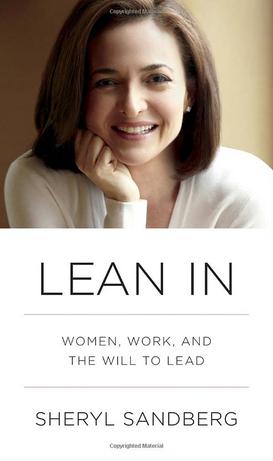
Sheryl Sandberg’s nonfiction book “Lean In: Women, Work, and the Will to Lead” came out last March and has stirred up a lot of talk either favorably or unfavorably about it ever since. Some have also seen her TEDTalk titled “Why We Have Too Few Women Leaders,” which she did in 2010. Currently Sandberg, the chief operating officer at Facebook, has a four-part series with co-writer Adam Grant on women at work running in the New York Times. The series continues with views that are in her book.
I picked up and read “Lean In” because my women’s book group chose to discuss it later this month, though I had been curious to read it since it came out. I don’t normally read business or books about employment, but it raises some interesting issues and I’m sure it’ll be a decent book for discussion as everyone has different work experiences and personal lives and views that will touch on things Sandberg brings up in the book.
Her main concern is the dearth of women in top executive or leadership positions at the workplace and that fewer women are aspiring to senior positions. She is upset that highly qualified and educated women are dropping out of the workforce and argues for getting more women in powerful positions by focusing mostly on what women can do to overcome the internal barriers that hold them back.
Yep, women, she maintains, are often holding themselves back from getting the top jobs. I’m sure many aren’t really pleased to hear this from a privileged, rich woman who had very powerful mentors along the way. As if she’s saying, I did it so what’s wrong with you? But generally I liked her book and thought it made many valid points. I didn’t agree with everything in it, but I did think it added to the discussion of working women, and I’m not one to dismiss it just because it looks inward at what women can do better.
In “Lean In,” Sandberg talks among other things about: increasing self-confidence, getting over stereotypes, reaching for opportunities, taking risks, getting mentoring, negotiating more, not worrying about pleasing everyone, applying for promotions, setting goals, and choosing a spouse that will equally share in household chores and childcare. She wants more women to “lean in” to their careers and more men to “lean in” to their families.
Quite a bit of what’s in the book might not be totally groundbreaking, you’ve likely heard these kinds of female business or self-help acumens before, but the book’s also well integrated with personal anecdotes and statistical research. I found both the stats and anecdotes revealing — and I thought quite a few of her tips were good and made me reflect on ways I could do things slightly differently at home or at work.
A few things I think that could’ve been cut from the book or that I would avoid would be: crying at work especially in front of your boss, smiling endlessly when asking for promotions, and asking any prospective employees whether they plan to have children. I guess I wouldn’t feel comfortable with these.
But I do share her premise that a world in which more women held power would be a better place, and I think it’s helpful of her to explore why we aren’t there yet. It’s definitely based on an array of complex reasons (both internal and external). I’d also point out there’s many ways to contribute to society and make an impact, and many ways to lead successful and fulfilling lives. Her corporate way is just one of many. I think she’d argue that women must keep going, reaching for goals and opportunities whatever their path might be and despite fears and obstacles. I found her book was good food for thought.
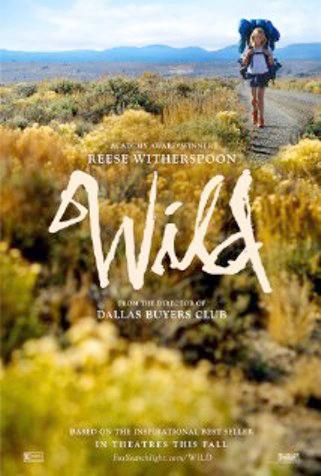
Meanwhile my husband and I saw the movie “Wild” last week, which I think we both liked. Many of those who read Cheryl Strayed’s 2012 memoir won’t be disappointed I think by the film version. It sticks pretty close to the book and enhances it with the beautiful visuals of the landscape and the performances by Reese Witherspoon as Cheryl and Laura Dern as her mother, both of whom have been nominated for Academy Awards for their portrayals.
“Wild” chronicles a young woman’s solo hike along the Pacific Crest Trail from the Mojave Desert to Washington State undertaken after the death of her mother and the end of her marriage. On the journey she finds solace and begins to heal.
I’m a sucker for such hiking/journey-types of finding oneself stories, and while I liked but didn’t love the “Wild” book, I was moved by seeing her journey on film. During Cheryl’s trek, there’s various flashbacks to her childhood with her brother and her single mother and also flashbacks of the downward spiral her life took in her late twenties. You feel her anguish and grief and also her healing as she moves forward. It’s a quiet film that captures her strenuous hike and internal struggles. It reminded me a bit of the 2010 film “The Way” with Martin Sheen, which similarly involves a long hike and the grieving process.
What about you have you read “Lean In” or seen the film “Wild” and what did you think? Continue reading
Posted in Books, Movies
22 Comments
The Enchanted and Unbroken
So the first book I read for 2015 … drumroll please … was “The Enchanted” by Rene Denfeld, which came out in March 2014. It left quite an impression on me and would’ve been my pick for best novel of 2014 if I had read it just a few weeks back. It’s very dark and brutal in some places but beautifully written and very well done.
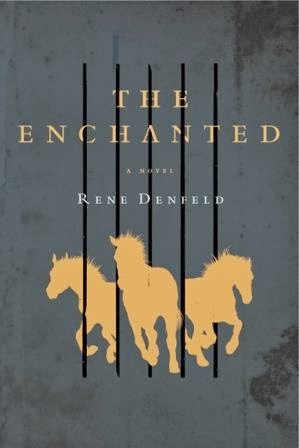
How to explain it? The novel takes place at an old stone prison where some of the inmates wait on death row. There’s a warden, a priest, and a lady investigator who visits trying to discover buried information about her clients’ pasts to save the soon-to-be executed. One part of the story is about her life and a case she is working on to save a prisoner named York. He doesn’t want to be saved though, but she pursues it, revealing some ugly truths about his past (and her own) while investigating in his hometown.
The other part of the story is about what goes on at the prison as told through the eyes of a reclusive death row inmate. All the awful things you hear about in prison and among inmates manifests themselves in the story in brutal ways. To escape his situation, the inmate disappears in his books and re-imagines the prison as an enchanted place where fantastical creatures rome. He’s fearful, living in his cell with covers over his head, but he’s able to sense what others cannot.
“The Enchanted” is an unusual and unsparing story about life on death row. It’s not too political (there’s characters in it on both sides), it’s not sentimental (definitely not Disney), it’s not forcing something down your throat, but rather by the end it gets to something of what it is to be human — both the violent and the good. You sense the humanity of those involved.
I can’t say I really realized what this book would entail when I picked it up. It’s quite harsh, so be forewarned. It’s not a light, feel-good book. It’s about the exact opposite of my last read “The Storied Life of A.J. Fikry,” which I found too sentimental. This one is not anything like that. Normally I would not pick up a novel about a death row prison, but I’m very glad I did. Despite its darkness, I was taken by the beauty of the book — the author’s descriptions — and how well it is done — exploring such themes of the human condition. It pretty much blew me away.
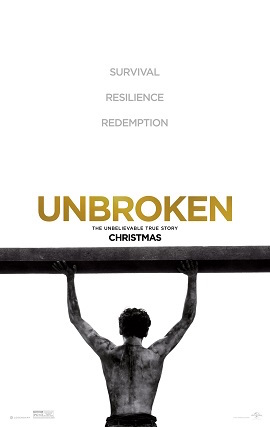
Speaking of humanity, I did see the film “Unbroken” the other night, and while I did think the film was good in various respects, I’m sorry to say it didn’t fully capture the essence of Laura Hillenbrand’s book about Louis Zamperini’s incredible life story. Notably it misses quite a bit of the context of the history in her book, and what life was like for servicemen in the Pacific theater during WWII. It also misses Louis’s formative post-war years completely by just putting a postscript at the end of the film.
I liked the early parts of “Unbroken” best of Louie running, and the flying scenes of the WWII bomber plane. The scenes on the raft were also vivid and Jack O’Connell does quite a reputable job as Louis Zamperini. But the brutal scenes once Louie gets captured and sent to the Japanese POW camp take a toll. As my nephew said: the film felt like a long series of really bad stuff occurring to one person. And for me: who wants to watch a movie of two hours of torture? Without more historical context of the collective war experience, and Louie’s redemption later in life, the film misses out on being a lot more. I think Hillenbrand would stress that Louis Zamperini was just one among hundreds of thousands of Allied servicemen who sacrificed and was a hero during WWII. Through her book, we get to learn a little bit more about their service in the Pacific theater.
What about you — have you read (or plan to read) “The Enchanted” or have you seen (or plan to see) the film “Unbroken” — and what did you think? Continue reading
Posted in Books, Movies
4 Comments
Still Alice, A.J. Fikry, & Imitation Game

I haven’t posted lately as I have been busy with all things related to Christmas, but my husband and I had a lovely week at the beach in California visiting my folks. Now we are back to the snow in Canada, wondering how the vacation went by so quickly. It’s the last day of the year, so I want to wish everybody a very Happy New Year! I’m sure like many of you I’ll be setting new reading goals in 2015, such as mixing in more nonfiction and maybe classics and upping the number of books that I hope to read. I also want to review a book from each month that’s just come out, thereby staying more current and topical. Meanwhile I have a few mini-reviews of books and a movie I saw on break.
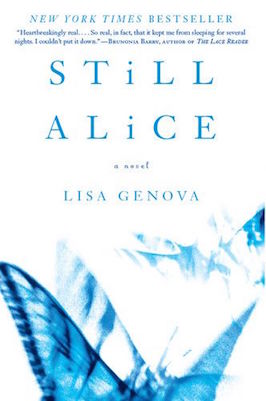
The first is Lisa Genova’s 2007 debut novel “Still Alice,” which I wanted to read as it is coming out as a movie with Julianne Moore and Alec Baldwin on Jan. 16. Much buzz has been talked about of Moore’s performance and whether it’ll be award-winning, so I was game for the book. Granted, it’s a bit of an odd choice at Christmas break, reading a story about a successful female professor at Harvard who gets diagnosed at 50 with early-onset Alzheimer’s disease. It’s quite sad sort of like all the plane crash news of AirAsia on TV this past week. How much can one take that’s depressing?
Yet “Still Alice” doesn’t bog down in overly sentimental, emotional gush. It tracks Alice’s diagnosis and what happens to her professional and family life as a happily married working woman with three grown children. As the disease progresses, the bonds of the family are tested, as well as Alice’s own identity of who she is if not the brilliant professor she once was. The novel’s a compelling quick read and is informative about the disease and its genetic link and testing. I flew through it, wanting to hear more of Alice even though her prognosis isn’t good. Also having the book told from Alice’s point of view, as she struggles through, definitely makes it more unique from other Alzheimer’s stories I’ve read, which are often told from the caretakers point of view. It adds more value and understanding to her situation too.
I liked “Still Alice” though there were a couple times that strained my believability, particularly the part where Alice shows up to teach the next semester without having told the university what’s happening despite the disease’s evident progression. She’s in denial all right, but she should have just told them and taken a leave instead of having to be confronted by the department head. Still it’s a moving book about a terrible disease that’s touched so many people’s lives. I’ll be curious to see the movie.
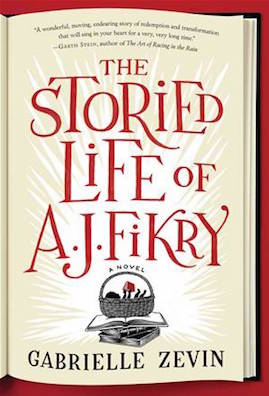
I also liked Gabrielle Zevin’s “The Storied Life of A.J. Fikry,” which has been quite popular this year. It’s a novel about a grumpy bookstore owner and widower on an island in New England whose life becomes transformed after a two-year-old baby is left abandoned at his store. Most of it takes place at the bookstore and captures a bit of the magic of books and bookselling so I was eager to read it having worked during my younger years in indie bookstores.
The novel starts strong and I immediately thought I was going to love it. There’s both humor and heart to it, and the first encounter between A.J. and the book sales rep Amelia is a funny exchange. The story also has a bit of intrigue when A.J.’s rare book of Poe’s poetry is stolen and the child is left at the store. The island clientele also makes for fun characters and a good book community.
“The Storied Life of A.J. Fikry” seems to have all the right ingredients but then somewhere along the way it becomes too sentimental and I couldn’t shake it for the rest of the book. Just seems a bit sweetened. So I liked it but didn’t end up loving it. Drat. I also thought it would delve more into books than it actually does. Oh the stories I could tell about the bookstores I ended up at.
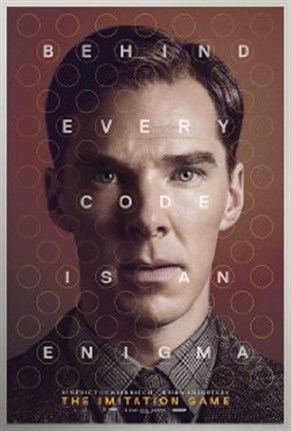
Last but not least, “The Imitation Game” is a movie I would highly recommend. The history behind the breaking of Germany’s Enigma Code during WWII is fascinating, and it stars Benedict Cumberbatch as Alan Turing, the real life mathematician who helped solve the code. What more do you want? It’s a race against time during the war, and not only do the code-breakers have to crack the code against a machine considered unbreakable, but once they do then they can’t let the Germans suspect they solved it. The film’s great and also involves the sad fate of what happened to Alan Turing after the war (no spoilers here). So far the film’s my favorite going into award season, but I still have plenty of others to see, so stay tuned.
What about you – have you read or seen any of these or do you plan to? And what did you think?
Continue reading
Posted in Books, Movies
29 Comments
